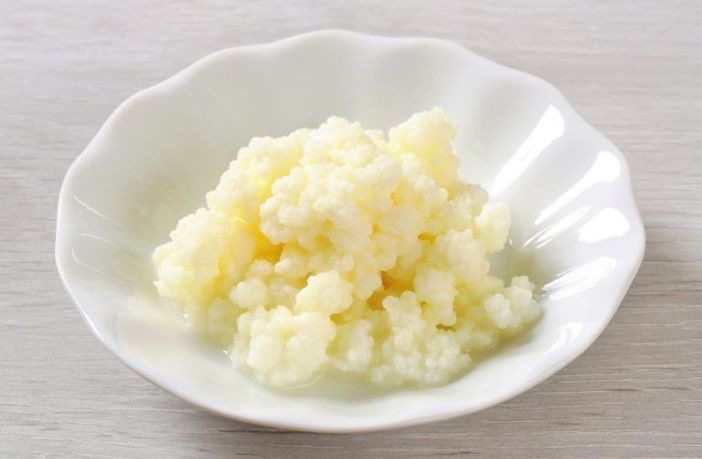Kefir is an ancient food that has long been treasured for its health promoting and medicinal benefits:
What is Exactly Kefir?
Kefir or Milk kefir is a probiotic rich fermented milk drink made by adding either kefir grains or a kefir starter culture to milk. Also known as búlgaros the drink has long been considered an elixir of youth, life and longevity by all those who drank it.
Where Does It Come From?
Kefir is thought to originate in the Northern Caucus Mountains, however other fermented milk and yogurt drinks with similar properties can be found in Europe, the middle east and Central Asia. The name kefir is thought to come from the Turkish word “keyif,” meaning “good feeling”. Kefir has been drunk for centuries – and was a closely guarded secret until the work by Dr. Ilya Metchnikoff brought attention to the benifts of the drink
Discovery of Kefir
 Kefir became popular throughout Russia in the 20th Century following the early research by Dr. Ilya Metchnikoff, the Russian immunologist credited with discovering the ‘probiotic’ properties of Lactic Acid Bacteria.
Kefir became popular throughout Russia in the 20th Century following the early research by Dr. Ilya Metchnikoff, the Russian immunologist credited with discovering the ‘probiotic’ properties of Lactic Acid Bacteria.
Dr. Ilya Metchnikoff– became curious as to why the people of the northern Caucasus lived so much longer that other similar populations. Examining their diets, he found fermented milk products were a notable constituent and suggested a connection between the bacteria in these foods and their health and longevity.
He theorized that the lactic acid bacteria present in fermented milk products such as Kefir helped to inhibit the growth of harmful microorganisms in their gut and contributed to their immune health.
Medicinal Uses
Following the work by Dr. Metchnikoff – for which he received the nobel prize in 1908, fermented milk products became widely recognized and prescribed for their medicinal benefits and were used in hospitals in Russia throughout the soviet era to treat conditions such as digestive disorders, cancer, tuberculosis, and even atherosclerosis.
Preparation of Kefir
While Kefir grains are mainly used to ferment fresh milk from mammals, although they can also be used with soy, coconut, rice and almond milks.
 To prepare Milk Kefir, add 1-2 tea spoons of Milk Kefir Grains to 3-4 cups of milk and leave to ferment at room temperature for between 12-24 hours – depending on the temperature. For detailed information on how to make Kefir follow our guide
To prepare Milk Kefir, add 1-2 tea spoons of Milk Kefir Grains to 3-4 cups of milk and leave to ferment at room temperature for between 12-24 hours – depending on the temperature. For detailed information on how to make Kefir follow our guide
Unlike other dairy products, Kefir has been found to be suitable for people with lactose intolerance as Kefir contains very little lactose, the sugar present in milk.
As most of the lactose has been broken down to lactic acid by the bacteria in the Kefir Grains and some broken down further into propionic acid.
Some of the lactose is converted to kefiran, a polysaccharide – or complex sugar thought to confer a number of the health benefits on humans. Kefiran has been studied extensively for its anti-inflammatory properties, anti-bacterial properties as well as strengthening the immune system.
Milk kefir can have a sour taste – like many fermented food products – and may have an effervescent or fizzy feel – depending on the culturing process. Like most fermented foods, small quantities of alcohol are produced in the fermenting process – typically well under 1%. Fermentation typically takes place over night depending on the temperature and quantities of grains involved.
What are Milk Kefir Grains?
 Milk kefir grains are a combination of live bacteria, yeasts in a matrix of protein, lipids and sugars, also referred to as a Scoby (a Symbiotic Culture of Bacteria and Yeast).
Milk kefir grains are a combination of live bacteria, yeasts in a matrix of protein, lipids and sugars, also referred to as a Scoby (a Symbiotic Culture of Bacteria and Yeast).
The lactic acid bacteria and yeasts that make-up the kefir grains can vary depending on the parent strain, the location and the conditions.
As a result each batch of Kefir can vary significantly. The Kefir grains are a living ecosystem of bacteria and yeasts and will survive for as long they are “fed” and cared for.
Health Benefits of Drinking Kefir
Studies have found the regular consumption of Kefir to be effective in managing the symptoms of food allergies and lowering blood sugar levels, blood lipid levels, high blood pressure, LDL (bad) cholesterol, and Hypertension.
Other benefits of probiotic foods such as Kefir can include better immune health, weight management, digestive health, inflammation and even mental health. They are also recognised for their health benefits in the treatment of a number of chronic diseases.
Probiotics Found in Kefir
Unlike Many Yoghurts – that usually contains 2 main strains of bacteria (Lactobacillus bulgaricusand Streptococcus thermophiles), Kefir can contain up to 40 different strains of bacteria and yeasts.

While each batch can vary in composition, the following is a list of bacteria and yeast strains found in kefir grains from different studies.
Bacteria Strains Commonly found in Milk Kefir Grains
- Lactobacillus acidophilus
- Lactobacillus brevis
- Lactobacillus casei
- Lactobacillus delbrueckii subsp. bulgaricus
- Lactobacillus delbrueckii subsp. delbrueckii
- Lactobacillus delbrueckii subsp. lactis
- Lactobacillus helveticus
- Lactobacillus kefiranofaciens subsp. kefiranofaciens
- Lactobacillus kefiri
- Lactobacillus paracasei subsp. paracasei
- Lactobacillus plantarum
- Lactobacillus rhamnosus
- Lactobacillus sake
- Lactococcus lactis subsp. cremoris
- Lactococcus lactis subsp. lactis
- Lactococcus lactis
- Leuconostoc mesenteroides subsp. cremoris
- Leuconostoc mesenteroides subsp. dextranicum
- Leuconostoc mesenteroides subsp. mesenteroides
- Pseudomonas
- Pseudomonas fluorescens
- Pseudomonas putida
- Streptococcus thermophilus
Yeast Strains Common to Milk Kefir Grains
- Candida humilis
- Kazachstania unispora
- Kazachstania exigua
- Kluyveromyces siamensis
- Kluyveromyces lactis
- Kluyveromyces marxianus
- Saccharomyces cerevisiae
- Saccharomyces martiniae
- Saccharomyces unisporus
Other Benefits of Drinking Kefir

Source: http://www.thegoodgut.org/kefir-the-elixir-of-youth-everything-you-need-to-know/
Disclaimer: We at Prepare for Change (PFC) bring you information that is not offered by the mainstream news, and therefore may seem controversial. The opinions, views, statements, and/or information we present are not necessarily promoted, endorsed, espoused, or agreed to by Prepare for Change, its leadership Council, members, those who work with PFC, or those who read its content. However, they are hopefully provocative. Please use discernment! Use logical thinking, your own intuition and your own connection with Source, Spirit and Natural Laws to help you determine what is true and what is not. By sharing information and seeding dialogue, it is our goal to raise consciousness and awareness of higher truths to free us from enslavement of the matrix in this material realm.
 EN
EN FR
FR



























Hi… Where can I buy kefir grains….in France at the moment and living in South Africa..thank you
I have heard of this recently. Someone in my area is selling kefir grains, but not knowing what it was, I just breezed by it. So now, I’m sure you know where I could buy some, with instructions. We also have a dairy that sells raw milk, for $10. A gallon.
Please respond with needed information.. Thank you .
Kefir makes the best smoothies…. fresh fruit, chia, protein powder, whatever healthy ingredients you want. Love it.
If you can get raw milk, it’s even better. It’s difficult up here in CNY to find a dairy that will give you raw cows milk as they are watched like hawks by the corrupt FDA. Now I’d like to try it with goats milk!
I just received a newsletter talking about how the medical industry is going vegan and how they’re considering removing all dairy, eggs, and meat from their cafeteria. Now I’m reading how kefir (which is a dairy product) is good for you. I don’t buy into vegan stuff anyways, there are tons of people who can’t function well on that diet at all and it’s been well documented. Sure, it works for a good amount of people too, but that doesn’t mean we should all do it or that it’s good for everyone to do.
What message are you trying to put out about dairy? It’s kind of confusing seeing 2 articles written by PFC that have conflicting messages.
I wonder if using raw/unpasteurized milk instead of the dead, completely stripped of anything good pasteurized milk (promoted by the goons of the Cabal, the FDA), will make any difference?